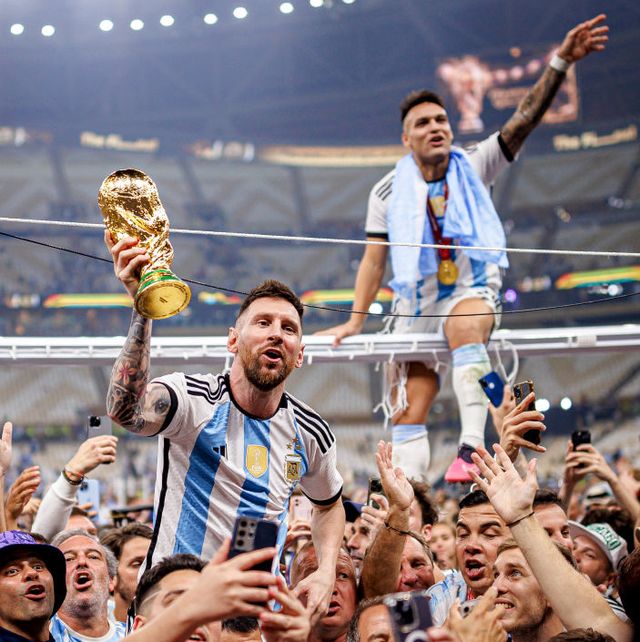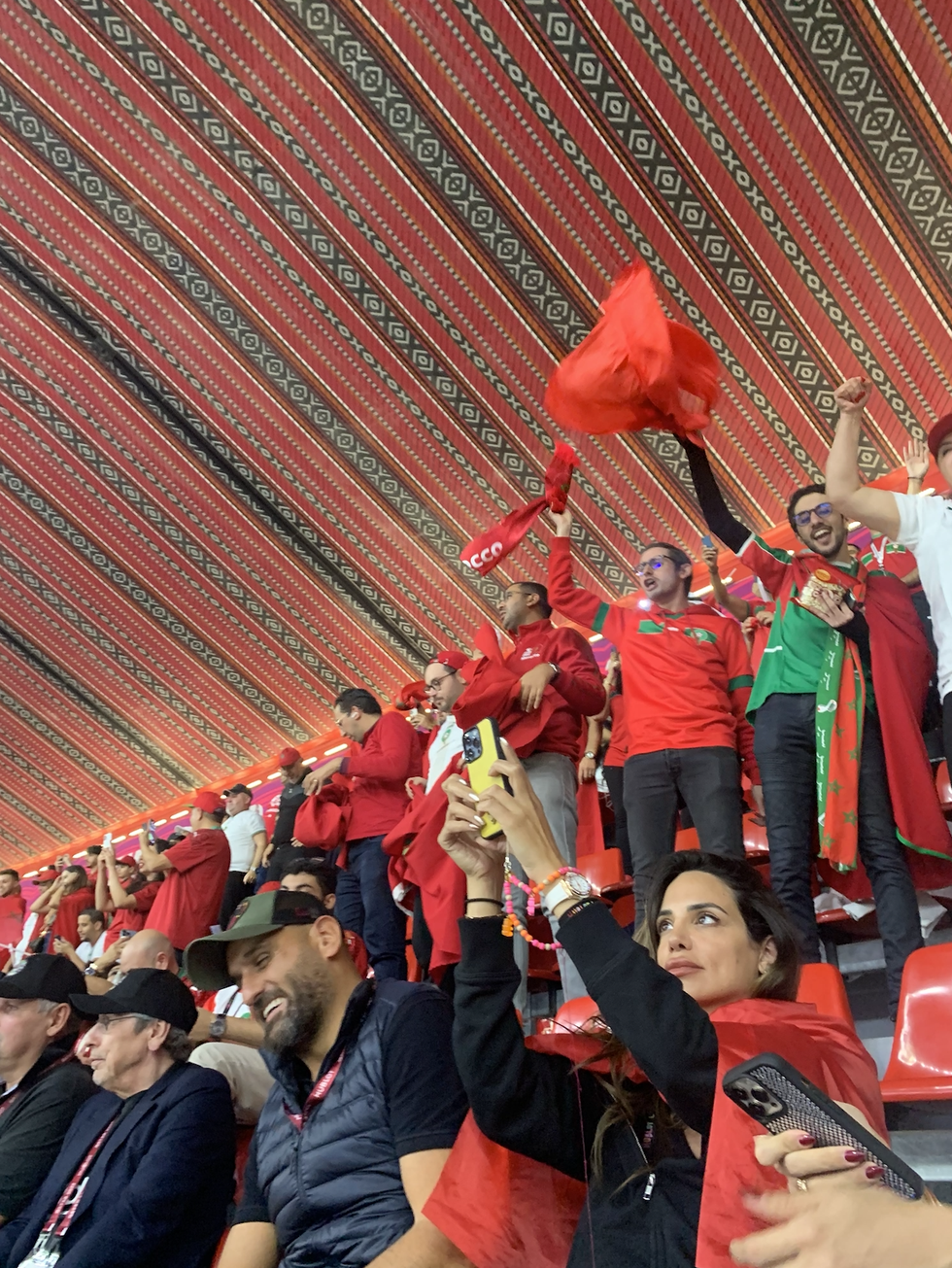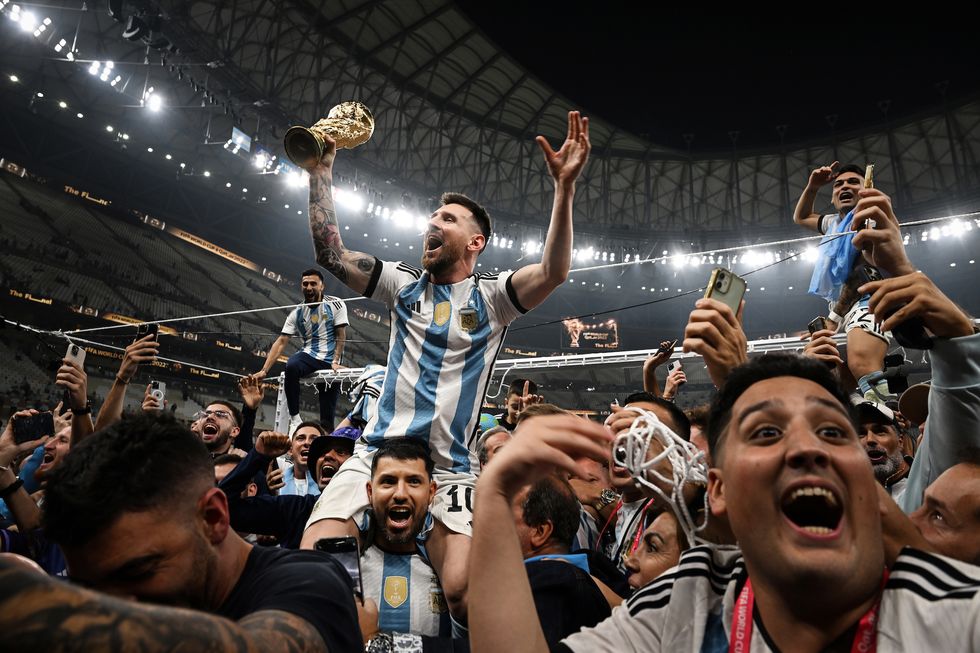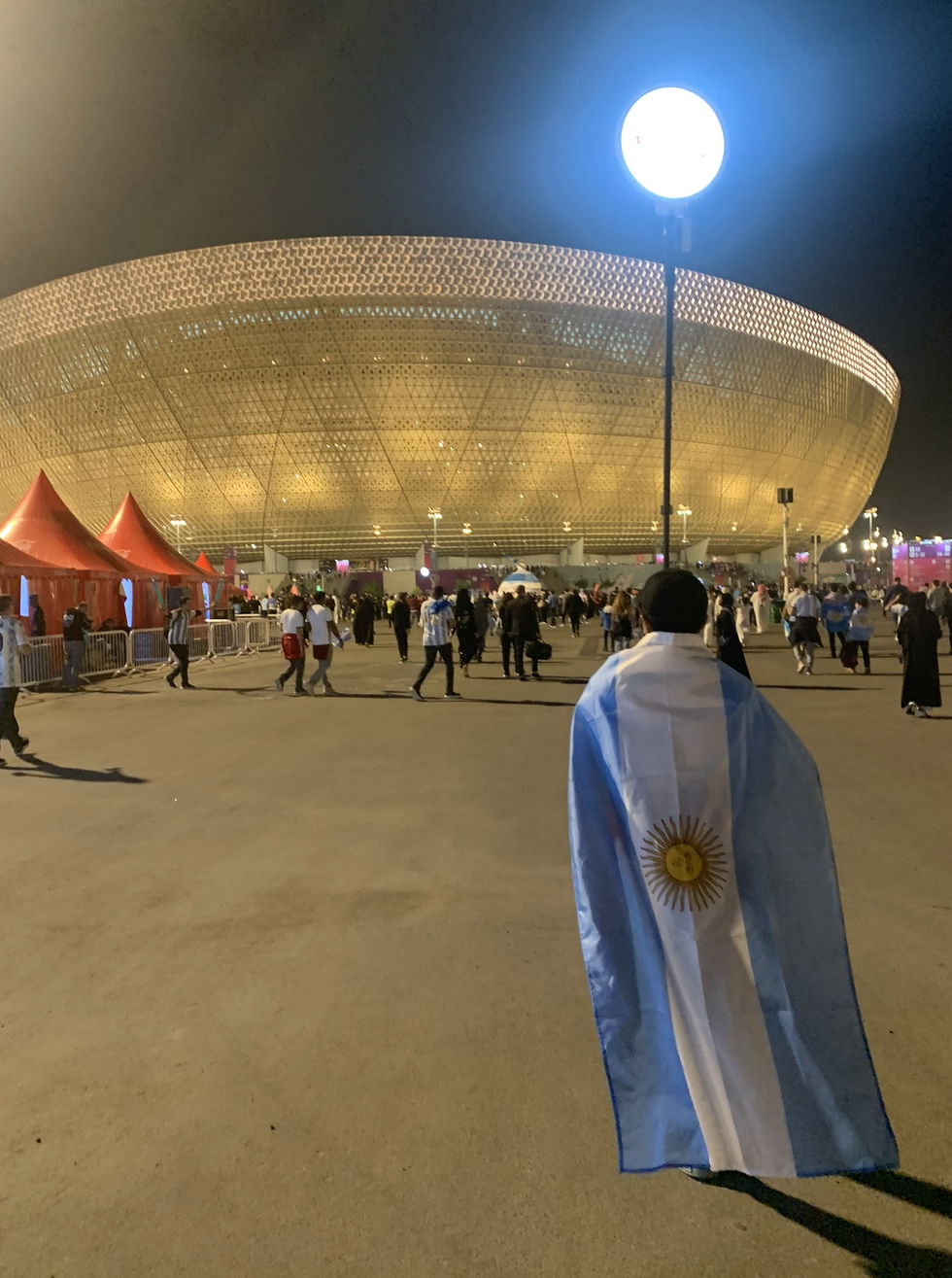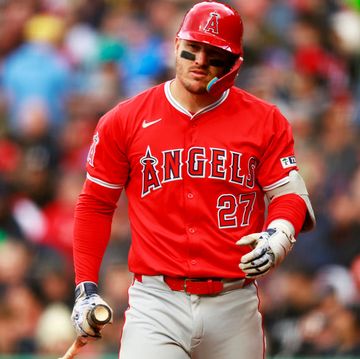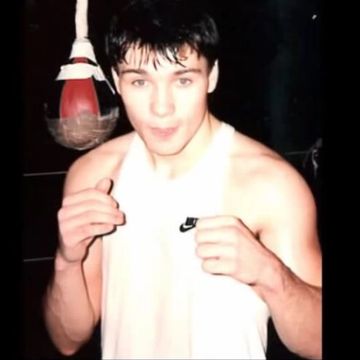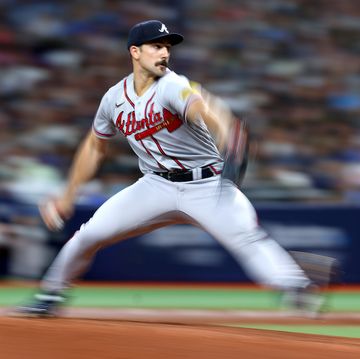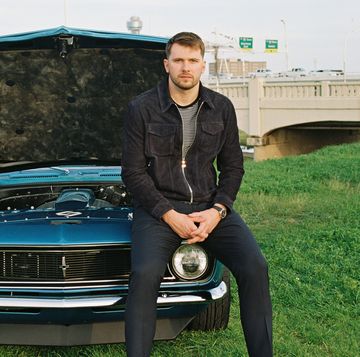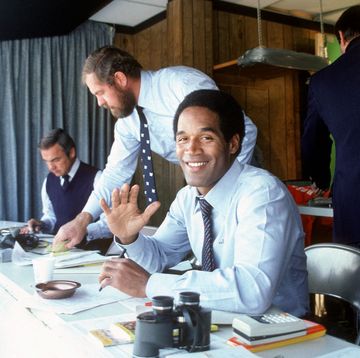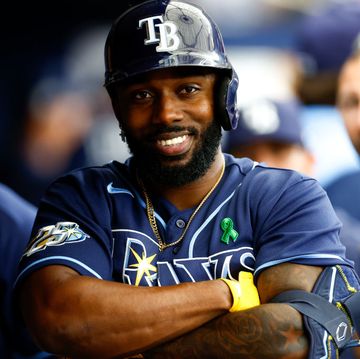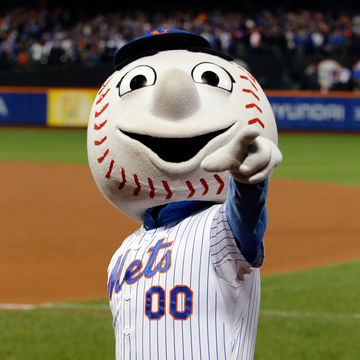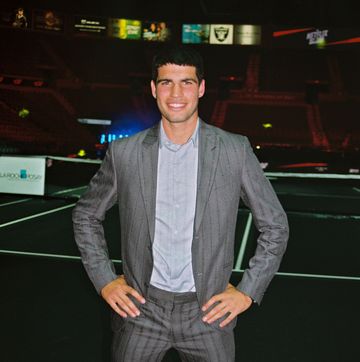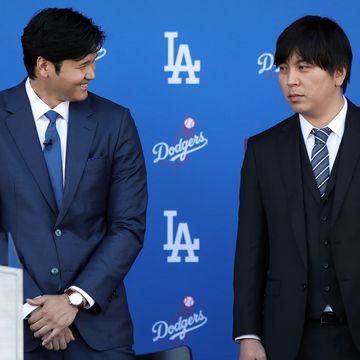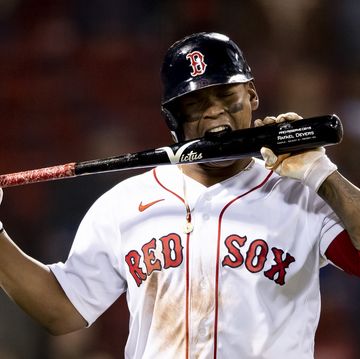As Lionel Messi held the ultimate trophy above his head, his jersey partially obscured by a black cloak placed on him by Qatari Emir Tamim bin Hamad Al Thani, you could feel the closing of the book. Messi opened the scoring in the World Cup final with a first-half penalty. 12 minutes later, he received the ball at the halfway line and took two deft left-foot touches—one to pop it up in front of him, the other to clip it around the corner to Julian Alvarez and get the Argentines behind the French defense in a lethal counterattack. Angel Di Maria made it 2-0 with a clever finish at the end of the flowing move, a scintillating display of pinpoint passing at mach speed that surely ranks among the greatest goals ever scored in this quadrennial showpiece.
When France came storming back through two goals in two minutes from the similarly dangerous Kylian Mbappé, dragging the match into extra time, there was Messi again, on the spot to put home a rebound and edge the Argentines in front. When Mbappé secured a hat trick with two minutes remaining, sending the match to penalties, it was Messi who took the first shot and scored to send Argentina on its way. It was, in aggregate, perhaps the greatest World Cup final ever played, and the game’s greatest-ever player seized it for himself and his team. 1,003 appearances for club and country. 793 goals. 387 assists. 7 Ballon d’Or awards, honoring the world’s best player in a given year. 10 times champion of Spain with Barcelona. Four-time Champions League winner. And now, as of Sunday, a champion of the world.
For all the fairy tales, though, it should be noted this was an exceptionally weird scene befitting an exceptionally weird tournament, and we’re not just talking about Emiliano Martinez’s celebration on winning the Golden Glove. For all the benefits of cultural exchange, the Bisht placed on Messi just before he was set to raise the trophy felt like a neat encapsulation of Qatar’s aims with this tournament—to not so much open themselves to the world as associate their country with things into which people pour their whole hearts, things from which they cannot detach themselves. A branding exercise, then, culminating with an attachment to Messi’s crowning achievement. His famous albiceleste number 10 jersey, the Argentina of it all, was shrouded at that moment of a thousand pictures. It was not enough for the tournament to be played in Qatar. Even its most indelible image will be claimed, in part, by the hosts.
Once I knew I’d be going to the tournament, I must confess I was not eager to fling criticism at the host nation, at least until I’d left the jurisdiction. For one thing, there seemed to be a sufficient number of people raising objections to Qatar’s human rights record, its treatment of women and LGBT people and migrant workers, and the process by which FIFA placed the tournament there. Qatar has no soccer tradition, and it’s so hot in summer that the tournament had to be moved to winter, disrupting the European club season. But I also genuinely feared a regime with this kind of thirst for control—over people, over narratives—even before soccer journalist Grant Wahl died, seemingly out of nowhere, a few days before my flight to Doha. He’d been strident in his criticisms of the hosts even while setting up shop in their country for a month, surely tempting retaliation, though his family has since said there was no foul play.
In the end, the tournament represented Qatar aptly. Arriving at Hamad International Airport, you’re met with a stunning network of sleek silver terminals, squeaky clean and seemingly brand-new even at eight years old. The place is the work of some of the world’s best architecture firms, the best money can buy, and so is the crowded skyline of downtown Doha. I was a fanatical SimCity player as a kid, and the whole place felt like the creation of someone playing the game on sandbox mode. Sweeping skyscrapers packed in together like sardines, holding some untold number of offices with a similarly untold occupancy rate. Mile after mile of four-lane highways that served as avenues, on and off ramps at uniform intervals. Terraformed islands and peninsulas, etched into the landscape where the sands of the Arabian desert meet the pale blue water of the Persian Gulf. It was the work of a people—well, some small slice of the population—who’ve pulled enough oil and gas from the ground beneath them to make anything possible.
At the National Museum of Qatar, another architectural work of art, you can trace the story of how a bedouin people who roamed across the desert from season to season first discovered that beneath the shimmering surface of the sea next door lay one of the world’s most bountiful pearlbeds, the fruits of which they’d harvest and sell to European nobles and maharajas to the East. And then they discovered what lay under the desert sand. Near the Lusail Iconic Stadium, the site of Messi’s heroics in the final and the semifinal before it, there are four metallic towers in varying shapes twisting up into the sky. They are the first pillars of a new central business district for Lusail city that will soon be created out of whole cloth. At night, they gleam purple and blackish gray against the horizon, a monument of mortal creation in the endless desert.
When I walked out the doors of the airport terminal and into the morning outside, the moon hung in the blue-orange sky through a layer of haze. It seems to blanket the air wherever you go, along with the feeling that something is keeping your feet on the ground and your head down. This is not a place where you express yourself, not really, and that was reflected in the atmosphere outside the stadiums. Some women visiting chose to wear a headscarf out in public, others did not. Drinking is prohibited, except in the hotels and restaurants where it is not. Before a World Cup semifinal where Argentina fans showed up in force, there was next to nothing of the party atmosphere you might have found in, say, Rio 2014. A festival-like DJ stage blasted EDM to a sparse crowd in the parking lot. The Moroccan fans built a party for themselves the following night, and they and the Argentines produced some massive noise inside the arenas. But any tournament where not a single England fan gets arrested is one where people are on their very best behavior—and not just because there wasn’t any Budweiser. Nobody was much interested in risking a look at the inner workings of the Qatari judicial system, not when a sign outside a stadium bathroom promised anyone caught vaping would be subject to a fine and “lengthy court proceedings.”
If not for, well, everything, it might have gone so differently for the Qataris. Surely they thought it would. They brought their unlimited resources and taste for fine architecture to bear on the stadiums, with air conditioning in open-air facilities and the offsetting eco-triumph of a whole arena—Stadium 974—that will now be broken down into shipping containers and reused. Lusail Iconic Stadium, home to a semifinal and the final, is a sweeping 89,000-seat masterpiece that claims to have zero carbon footprint—though it does, in my direct experience, feature stairwells with no emergency exits across seven stories. (That’s how, if anything goes wrong, you get a crush.) And then there was Al Bayt, site of that meeting between Morocco and France, which is built to resemble a bedouin tent: black and white horizontal stripes on the outside with the pitched silhouette, brilliant red and brown cross-hatch patterns on the interior walls and ceiling that evoke life in Qatar before the oil and the pearls.
These were grand stages made for the grandest event, and in the end, perhaps the ruling authorities will see this all as a success. It could be worth all those billions of dollars, just as it will be worth it to the Emiratis and the Saudis to sink all that money into Manchester City and Newcastle United. Sportswashing works. It connects your national brand to things that thrill and delight, to sport’s power to deliver the unexpected—the literally unpredictable—and the promise that the future really is unwritten. We came into this tournament with expectations of Brazilian balletic dominance, only to see them erased by a Croatian team with steel and experience and a bit of cynicism. Morocco shocked the world as they became the first African team to reach the semifinals, sending the Iberian titans of Spain and Portugal packing in the knockout rounds having seen off Belgium in Group F. Japan beat Spain and Germany to send the latter packing at the group stage. Even Argentina dropped its opening match. Team USA arrived with a core group representing a young generation of American footballers unlike any that has come before, staking their claim as an outfit to watch this decade. After all, it’s coming home in 2026.
The Americans came up short against the Dutch, who then rekindled their decades-long blood feud with Argentina in the next round. They could not match the South American champions, though, not when Messi went into his old bag of tricks to create that opening goal. He produced another almost incomprehensible assist in the following round, as Argentina continually made it difficult for themselves but never faltered. They played with fire in their bones, history in their sights, and delivered glory to themselves and their nation and their talismanic leader. Perhaps, someday, the specifics will fall away when it comes to the stage on which the little man did one last great thing. It was only one of many grand stages he has graced, in truth. He has vanquished the mighty French, the defending champions, and settled every debate. This is the age of Lionel Messi and no one else, the time of the greatest footballer who ever lived.
Jack Holmes is a senior staff writer at Esquire, where he covers politics and sports. He also hosts Unapocalypse, a show about solutions to the climate crisis.
